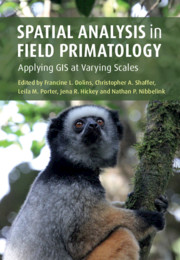Book contents
- Spatial Analysis in Field Primatology
- Spatial Analysis in Field Primatology
- Copyright page
- Dedication
- Contents
- Contributors
- Acknowledgments
- 1 Why Place Matters, and its Use in Primate Behavioral and Ecological Research
- Part I GPS for Primatologists
- Introduction
- 2 Fundamentals of GIS and GPS
- 3 “Next-Gen” Tracking in Primatology
- 4 The Ethical Implications, and Practical Consequences, of Attaching Remote Telemetry Apparatus to Macaques
- 5 Processing Geospatial Data in R
- 6 Estimating Travel Distance and Linearity of Primate Routes
- Part II GIS Analysis in Fine-Scale Space
- Part III GIS Analysis in Broad-Scale Space
- Index
- Plate Section (PDF Only)
- References
2 - Fundamentals of GIS and GPS
from Part I - GPS for Primatologists
Published online by Cambridge University Press: 29 January 2021
- Spatial Analysis in Field Primatology
- Spatial Analysis in Field Primatology
- Copyright page
- Dedication
- Contents
- Contributors
- Acknowledgments
- 1 Why Place Matters, and its Use in Primate Behavioral and Ecological Research
- Part I GPS for Primatologists
- Introduction
- 2 Fundamentals of GIS and GPS
- 3 “Next-Gen” Tracking in Primatology
- 4 The Ethical Implications, and Practical Consequences, of Attaching Remote Telemetry Apparatus to Macaques
- 5 Processing Geospatial Data in R
- 6 Estimating Travel Distance and Linearity of Primate Routes
- Part II GIS Analysis in Fine-Scale Space
- Part III GIS Analysis in Broad-Scale Space
- Index
- Plate Section (PDF Only)
- References
Summary
All data are spatial. Try to think of a piece of data that is not spatial, and we bet with a little more thought, you could come up with a spatial characteristic of those data! Perhaps the name of a historic figure? That name has a provenance … it was given in a particular place, and the person may have lived in one or more places, and moved about the surface of the Earth according to some pattern. And the name itself (if written) has a length measured in number of letters, and it has shapes and sizes that affect its perception by others, much like the spatial elements of a map communicate something to its audience.
Information
- Type
- Chapter
- Information
- Spatial Analysis in Field PrimatologyApplying GIS at Varying Scales, pp. 14 - 41Publisher: Cambridge University PressPrint publication year: 2021
References
Accessibility standard: Unknown
Why this information is here
This section outlines the accessibility features of this content - including support for screen readers, full keyboard navigation and high-contrast display options. This may not be relevant for you.Accessibility Information
- 1
- Cited by
